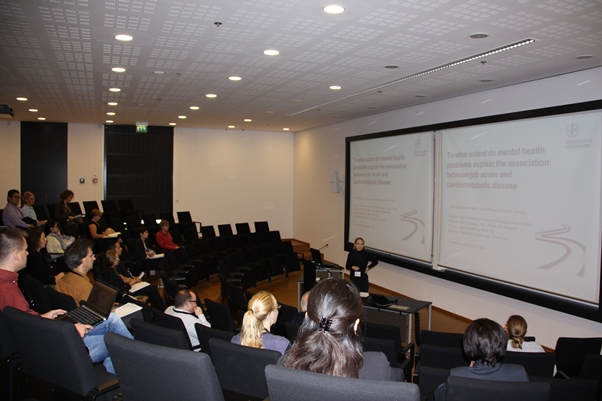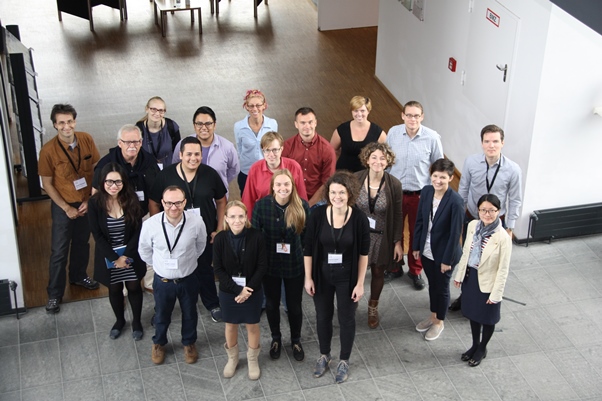IUSSP Course and Seminar on Causal Mediation Analysis in Health and WorkRostock, Germany, 26-29 September 2016 Organized by the IUSSP Scientific Panel on Pathways to Health Chair: Mikko Myrskylä (Max Planck Institute for Demographic Research - MPIDR) Membership: Tommy Bengtsson (Lund University), Alain Gagnon (Université de Montréal), Ke Shen (Fudan University, Shanghai), Gerard Van Den Berg (University of Mannheim), Ken Smith (University of Utah).
On 26-29 September 2016, the IUSSP Scientific Panel on Pathways to Health held an International Course and Seminar entitled “Causal Mediation Analysis in Health and Work.” It was hosted by the Max Planck Institute for Demographic Research (MPIDR), which is based in Rostock, Germany.
The four-day course and seminar brought together 27 junior and senior researchers working at the intersection of labour market participation, retirement, and health and aimed to shed light on the life-course processes that influence labour market performance and older-age health. The first three days were devoted to a course on causal mediation analysis. On the fourth day, a presentation workshop was held with twelve presentations on life-course, health and work.
Professor Tyler VanderWeele from Harvard University taught the three-day course. He covered recent developments in causal mediation analysis and provided practical tools to implement these techniques. Mediation analysis concerns assessing the mechanisms and pathways by which causal effects operate. Tyler discussed the relationship between traditional methods for mediation in epidemiology and the social sciences and new methods embedded in the counterfactual causal inference framework. For dichotomous, continuous, and time-to-event outcomes, attention was given as to when the standard approaches to mediation analysis are and are not valid. Extension of these approaches to more complex settings was also discussed. The assumptions needed for these techniques, most prominently the no-unmeasured confounding assumption, were described. SAS, SPSS and Stata macros to implement these techniques were discussed. The use and implementation of sensitivity analysis techniques to assess how sensitive conclusions are to violations of assumptions were covered, as were extensions to multiple mediators.
Tyler also provided the group with an optional project exercise for those participants who wanted to practice the concepts taught in his lectures. The exercise was distributed right at the beginning of the course. On two afternoons, time was set aside for participants to work on this optional project. Solutions to the project were distributed on the third day of the course and were discussed by prof. VanderWeele.
On the fourth and final day of the seminar, the group moved on to the presentation workshop with twelve papers on life-course, health and work. Late-life labour force participation and health are determined not only by recent lifestyles and work place conditions, but also by factors earlier in life, possibly dating back to fetal stage or prior generations. The pathways from early life conditions to later life outcomes may be direct, through permanent but latent damage that manifests itself later in life, or indirect, for example via socioeconomic achievement and life-styles. Consequently, the paper presenters analysed health conditions and labour market performance in older ages, focusing not only on contemporary conditions, but also on conditions over the life course, beginning in early childhood.
To adequately study the life course, the papers used longitudinal data and, given the international character of the workshop, many countries. The methods used in the papers were diverse, spanning classical regression and structural equation modelling, to tried and proven methods such as quasi-natural experiments, to newer approaches such as inverse proportion of treatment weighting and the G-formula. Not all of these methods were embedded in the counterfactual causal inference framework that prof. VanderWeele is a proponent of, which also gave rise to the question of what causality is and how it should be determined.
The different papers showed that health and employment relate across the life course in a variety of ways. Perhaps most prominently it was found that the meaning and effect of employment is highly life course and context dependent; e.g. while one paper showed that an increase in pension age resulted in higher mortality among the affected population, another paper showed that employment at young ages is protective against depression. Where one paper found that education was not as important in affecting health as often implied when cognitive ability is taken into account, another found that educational gradients did affect time spent in employment even when controlling for many other factors. As indicated, such different findings are likely caused by contextual differences, but may also be method dependent. At the end of the workshop, many participants agreed that it would be interesting to implement the techniques that prof. VanderWeele taught, not only to see how this may affect their findings, but also because it allowed them to answer questions on mediation and causality not previously thought possible.
A short evaluation survey was conducted after the seminar. Participants provided extensive feedback on both the course and the presentation workshop. They very much liked Tyler VanderWeele’s teaching style, emphasizing his very clear explanations of complex and advanced methods. As for the presentation workshop, participants appreciated the diversity of the papers on the common theme of work and health. Many presenters indicated that they received very valuable feedback on their paper.
See also:
Funding The Seminar was financially supported by:
|


